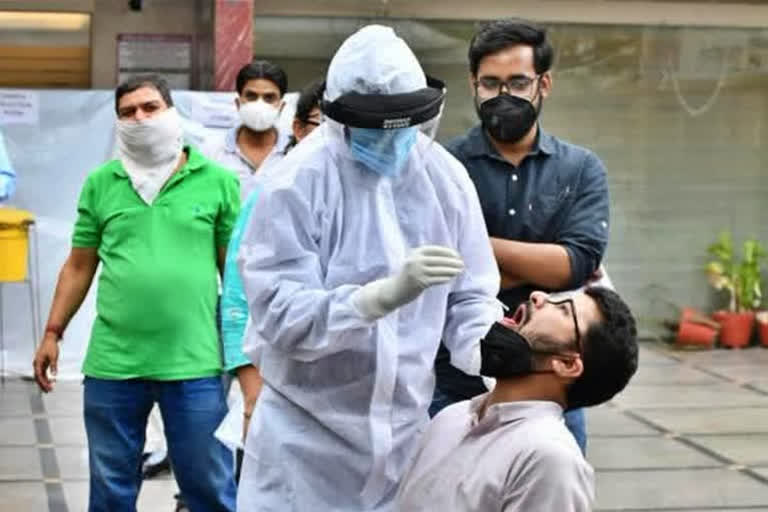New Delhi: As India looks to ramp up COVID-19 testing to deal with the surge in coronavirus infections, Indian Council of Medical Research (ICMR), the body leading the COVID-19 response in the country, has given its nod to a Korean company’s antigen-based coronavirus test kit that gives results in 30 minutes.
Standard Q COVID-19 Ag detection kit developed by Korean company-SD Biosensor is a rapid chromatographic immunoassay for the qualitative detection of specific antigens to SARS-CoV-2.
"Suspected individuals who test negative for Covid-19 by rapid antigen test should be tested sequentially by RT-PCR to rule out infection, whereas a positive test should be considered as a true positive and does not need reconfirmation by RT-PCR test", ICMR said.
The most positive part of the kit is that it can be performed on-field and provides information that the patient is currently infected or not.
“It is different from the rapid antibody test kit. A positive test in antigen should be considered positive and does not need reconfirmation by RT-PCR test,” the ICMR said.
Till date, real-time RT-PCR was the gold standard frontline test for diagnosis of COVID-19.
How it is different from RT-PCR test?
An official from ICMR said that various open and closed RT-PCR platforms (Open systems RT-PCR machines, TrueNat and CBNAAT) are currently being used for COVID-19 diagnosis in India.
All these platforms require specialized laboratory facilities in terms of equipment, bio-safety and bio-security. Minimum time taken for the test varies between different systems with a minimum of 2-5 hours including the time taken for sample transportation. These specifications limit the widespread use of the RT-PCR test and also impedes quick augmentation of testing capacity in various containment zones and hospital settings.
The development came at a time when India was in an urgent need of a reliable point-of-care rapid antigen detection test with good sensitivity and specificity for early detection of the disease.
The tests will not only help in allaying the anxiety and fear of healthcare workers and aid in the better clinical management of the patients but also help in the proper implementation of the government strategy to test, track and treat.
“In view of this, an independent two site evaluation of the only available or standalone antigen detection assay: Standard Q COVID-19 Ag detection kit, was conducted with an aim to evaluate its sensitivity, specificity and feasibility of use as a point-of-care test for early detection of SARS-CoV-2,” he added.
How does it work?
The kit comes with an inbuilt COVID antigen device, viral extraction tube with viral lysis buffer and sterile swab for sample collection. One Nasopharyngeal swab needs to be collected using the customized sample collection swab provided with the kit. No other sample (throat swab, bronchoalveolar lavage or sputum) should be used.
After sample collection, the swab should be immersed and squeezed in the viral extraction buffer, provided with the kit. This buffer inactivates the virus thereby, reducing biosafety and biosecurity requirements. The test does not work if the sample is collected in the usual Viral Transport Media (VTM), routinely used for the collection of OP/NP swabs.
Once the sample is collected in the extraction buffer, it is stable only for one hour. Therefore, the antigen test needs to be conducted at the site of sample collection in the healthcare setting. Transportation to the lab is not recommended.
Once the sample goes into the buffer and is mixed properly, the buffer tube cap needs to be replaced with a nozzle provided with the kit and 2-3 drops of the sample with buffer are put into the well of the test strip.
The test can be interpreted as positive or negative after 15 minutes of putting the sample into the well by the appearance of test and control lines, which can be read with a naked eye, requiring no specialized equipment. The maximum duration for interpreting a positive or negative test is 30 minutes. After that, the test strip needs to be discarded.
The test kit should be stored between 2° to 30° C, the ICMR said.
It further said that the rapid antigen detection test has a very high specificity (ability to detect true negatives) ranging between 99.3 to 100 per cent at the two sites.
The sensitivity of the test (ability to detect true positives) ranged from 50.6 per cent to 84 per cent in two independent evaluations, depending upon the viral load of the patient. Higher viral load correlated with higher sensitivity.
ICMR recommends the testing can be conducted in containment zones and hotspots
ICMR, however, recommends the use of Standard Q COVID-19 Ag detection assay as a point of care diagnostic assay for testing in combination with the gold standard RT-PCR test.
The apex medical research institute suggested that testing could be done in containment zones or hotspots (to be performed onsite under strict medical supervision and maintaining the kit temperature between 2° to 30° C.), all symptomatic Influenza-Like Illness (ILI), asymptomatic direct and high-risk contacts with co-morbidities (lung disease, heart disease, liver disease, kidney disease, diabetes, neurological disorders, blood disorders) of a confirmed case to be tested once between day 5 and day 10 of coming into contact.
Also read:Coronavirus: Ganjam district in Odisha imposes lockdown till June 30
